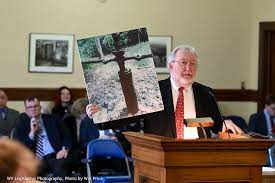The West Virginia Surface Owners Rights Organization, of which I am a cofounder, stands up for surface owners when the oil and gas drillers show up with bulldozers.
The common law says that if I own the surface, but someone else owns the minerals and leases them to a driller, I get no share of the value of the oil and gas that my surface land is used to produce. Only in the 1980s did surface owners finally even get limited compensation for the damage done to their land — the amount of the existing use such as growing hay was worth to the surface owners, not what use of their land is worth to the driller and mineral owner.
The Legislature has never regulated the deeds severing ownership of the minerals (usually to out-of-state owners) from the ownership of the surface in a way that might have given the surface owners more say over where well pads, pipelines etc. can be built — let alone what share the surface owner might get from the profits of drilling and producing using their land.
The Legislature has also never enacted regulations to protect mineral owners when signing leases to drillers (usually to out-of-state companies).
Almost every lease that I have seen drafted by the driller for the mineral owner to sign contains a “general warranty” clause. That means if the driller’s title work was wrong, the mineral owner has to pay for the driller’s lawyers when the driller gets sued by someone else who thinks the minerals were theirs and did not belong to the person the driller got to sign the lease.
So, if the driller is sued for the money the driller wrongfully paid to the person who the driller asked to signed the lease, then the person who signed the lease has to pay the driller’s attorney fees. I am not making this up. And many of the leases had provisions allowing free use of the surface for pipelines for wells that were not on the leased tract. And many of the leases had provisions that let the lease be held for decades by use for gas storage fields by paying the mineral owners only $1 an acre a year — again not a share of the money the driller made by using the storage field.
The Legislature never stepped in to regulate leasing, it only enacted forced pooling when mineral owners would not sign the drillers’ leases.
Now, finally, surface owners who got no share of the value of their land being used for oil and gas production have the opportunity to get paid for entering into carbon credit agreements that require scientific management of timber cutting. And now the Legislature is considering enacting regulation of transactions with landowners (Senate Bills 618 and 822).
Now, when the surface owner can get paid some money by persons or entities (usually out of state) who want to offset their carbon generation by paying us to manage our timberland in a carbon friendly way, now when we can finally get paid some money for scientifically managing our timber — now the Legislature is considering two bills that will at least inhibit and more likely eliminate West Virginia surface owners from getting this money.
Not everyone agrees that the buying and selling of carbon credits is a good idea.
But the Legislature cannot stop other states from authorizing it or stop private entities from purchasing the credits to enhance their image. All the Legislature can do is pass bills chasing the money out of West Virginia to surrounding states that do not interfere. The Legislature should prove its bona fides as advocating for a free market and less government and private property rights. Prove that West Virginia is not just a big company town. Don’t pass these bills.
David McMahon is a lawyer in Charleston. He is dedicated to the public interest.
NOTE ~ Please join the WV Surface Owners Rights Organization ASAP, that we definitely help!
See the Web Site ~ WVSORO.org. Julie Archer is the Executive Director, and needs your help!
URL: https://www.wvgazettemail.com/opinion/op_ed_commentaries/david-mcmahon-wv-looking-to-rip-off-surface-rights-owners-opinion/article_fdaeff14-8b0a-5b6b-8c77-41006ad17757.html

